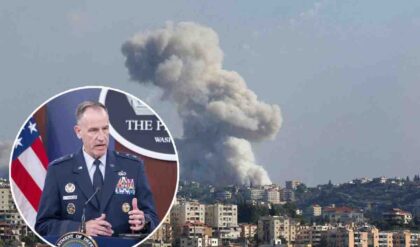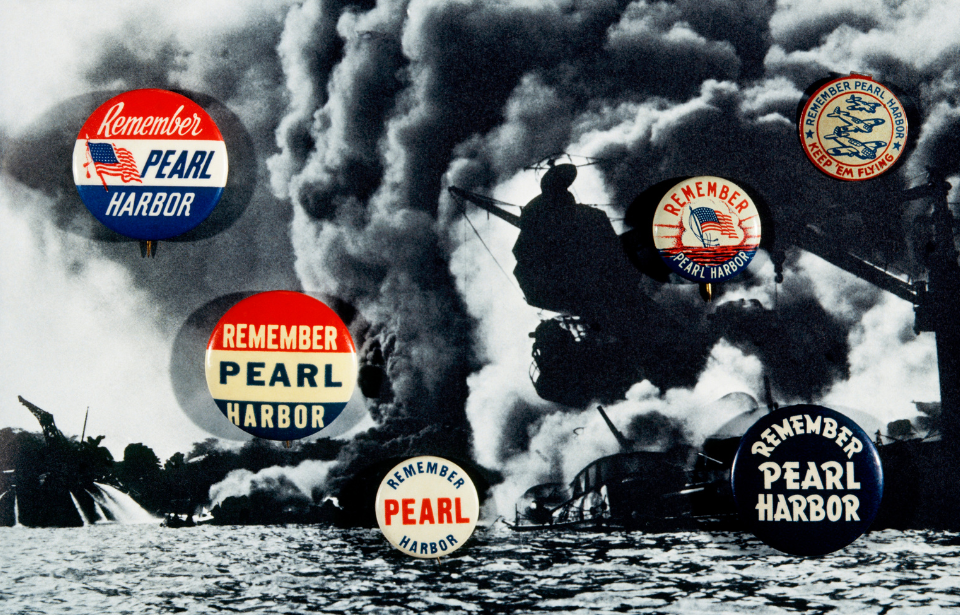
American history forever changed on December 7, 1941 when Japan launched a horrific attack on Pearl Harbor, catapulting the United States into the Second World War. In the days and months that followed, media took to the streets to ask civilians and military personnel for their opinions on the incident, the country’s role in the conflict and its potential outcome. Approximately 1,200 hours of these Pearl Harbor-related interviews are stored at the Library of Congress.
“Man-on-the-street” perspectives
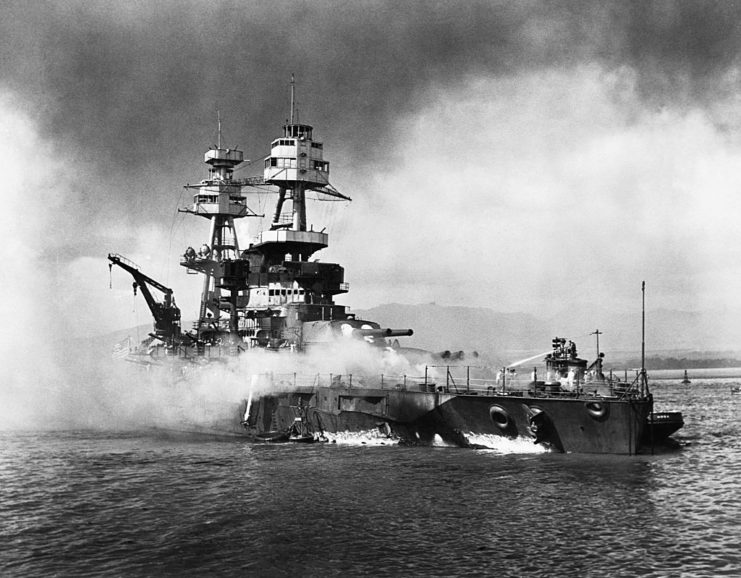
USS Nevada (BB-36) following the Japanese attack on Pearl Harbor, December 7, 1941. (Photo Credit: CORBIS / Getty Images)
On December 8, 1941, the “assistant in charge” of the Archive of American Folk Song, Alan Lomax, sent a telegram to workers in 10 locations throughout the US, asking them to record “man-on-the-street” interviews of everyday people sharing their feelings about the Japanese attack on Pearl Harbor and America’s declaration of war.
In the following days and weeks, these interviews captured a snapshot of everyday life during World War II, for soldiers and civilians alike. One interview from December 8th, conducted in front of the Gayety Theater in Washington, DC by Lomax and Philip Cohen, featured several soldiers’ thoughts on the conflict.
“How about it, do you think we have a good chance of winning?” Cohen asked the group.
“No doubt about it,” one answered, while a second added, “I don’t think anyone else is stronger.”
“Do you think we’re going to come out of this thing OK?” Cohen then asked.
“I hope,” the second draftee replied.
“What was the first feeling you had, any of you fellas, about it when it first-” Cohen continued, before being cut off by the soldier. “Might as well get it over with” he said. “We’re here, we got to learn, so we might as well make use of it.”
The public’s thoughts regarding the attack on Pearl Harbor
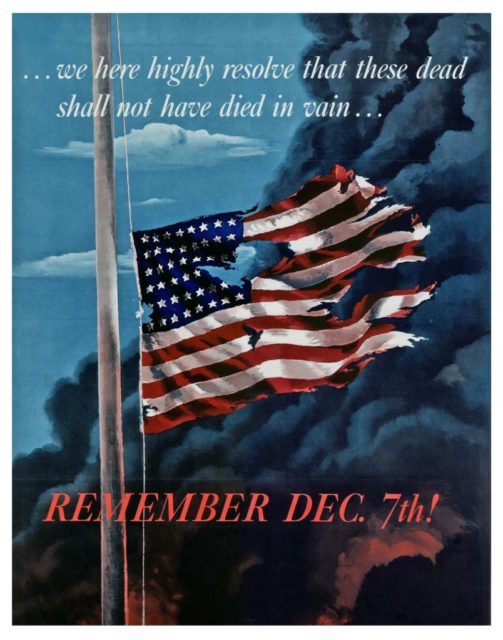
Photo Credit: Photo 12 / Universal Images Group / Getty Images
An interview conducted on December 10, 1941 in Bloomington, Indiana by Paul Martin involved a high school sophomore named Mike Fox. “Mr. Fox, tell us just nearly as you can, just what you thought of the war when you heard of the declaration of war by Japan? I mean, the attack of the Japanese planes upon Pearl Harbor last Sunday?” asked Martin.
“Well, I was stunned and, at first, I didn’t believe it,” Fox replied.
“Well, after that period left you, then what did you think about it?” Martin continued.
“Oh, I’d say it was one a feeling of fury and anger that we had been betrayed,” said Fox.
Other passers-by chimed in, some criticizing the US government for showing ignorance toward the threat posed by Japan, while others commented that it was the “treacherous” Japanese who’d misled American leaders.
Responding to Franklin D. Roosevelt’s ‘Day of Infamy’ speech
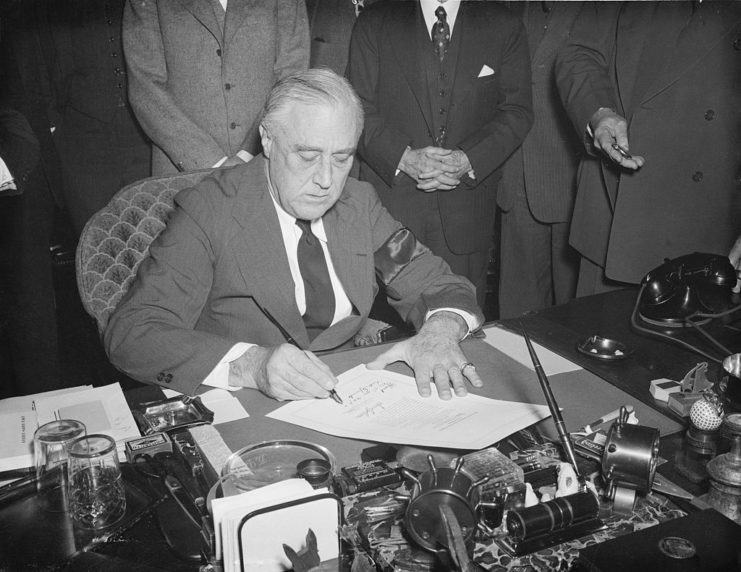
President Franklin D. Roosevelt signing the declaration of war against Japan following the attack on Pearl Harbor, December 8, 1941. (Photo Credit: Bettmann / Getty Images)
Following President Franklin D. Roosevelt‘s historic address to the nation the day after the attack on Pearl Harbor, several man-on-the-street interviews were conducted in New York City, asking people for their thoughts regarding what was said.
Edward J. Huddy, a telephone operator, shared:
“I listened to President Roosevelt’s speech and I thought it was a very fine speech. I really believe that he sincerely means to end this aggression against democracy, and the whole country is behind him. I served overseas in the last war and know that war is a terrible thing. And I hope it don’t last long, and I hope that everybody will cooperate with the president and do everything they can to make it a short, quick war and that we will be victorious in the end.”
Unfortunately, only one of Huddy’s wishes came true. WWII did end in an Allied victory, but only after a further four years of fighting. Over the course of the conflict, more than 10 million men were drafted into the US Army, Navy and Marine Corps. Of those who served, over 400,000 never returned home, according to the National WWII Museum.
History repeating itself
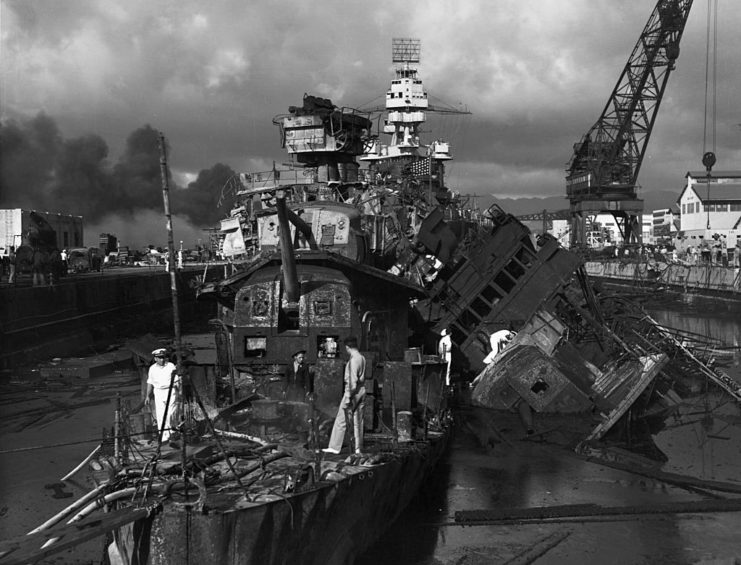
USS Cassin (DD-372), Downes (DD-375) and Pennsylvania (BB-38) following the Japanese attack on Pearl Harbor, December 7, 1941. (Photo Credit: CORBIS / Getty Images)
Several interviewees noted times throughout history when similar events had occurred and questioned why the US government hadn’t seen the attack coming. One unidentified man from Burlington, North Carolina commented:
“To think that a thing like that could happen and catch them when they’re off guard, that’s what I think about it. They ought to have known what Japan did to Russia in 1904. They all had attacked them and did all the damage they could before they ever declared war, they might have known they’d do the same thing again… If a dog bites you once, you don’t trust him the next time surely.”
The speaker was referring to the Russo-Japanese War, which began in February 1904 after Japan attacked the Russian squadron at Port Arthur, without a declaration of war. Government and military officials had planned the attack after decades of tense relations, caused by Russia’s attempts to expand its territory into Japan.
Though many Americans disagreed on many aspects relating to the attack on Pearl Harbor, there was one thing they all agreed on: unity. “This sudden and unfortunate attack of the Japanese on our country has revealed in start outline a tragic attitude of unpreparedness and selfish indifference on our part to the real dangers confronting our nation and our democratic way of life,” said Reverend W.J. Faulkner.
More from us: 33 Rare Photos of the Attack on Pearl Harbor
“Too long have we been divided at home. For we have been dissipating our vast strength and straining our national unity through labor conflicts and class bickering,” he continued. “I earnestly hope that, at last, we have become struck wide awake to the real threats to our national safety at home and abroad, and that we will be galvanized into effective action by uniting all of our people and resources on a basis of equality.”


